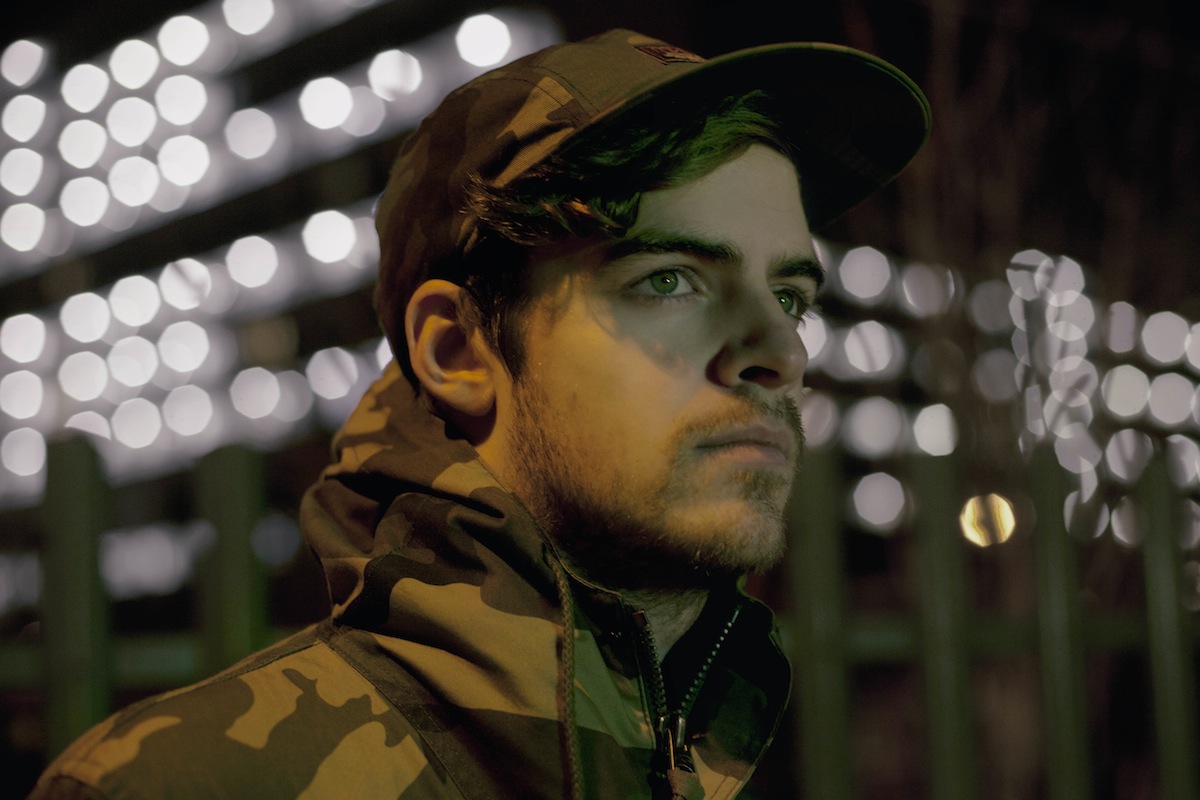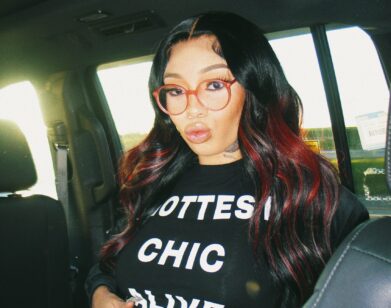Ryan Hemsworth’s What Ifs

ABOVE: RYAN HEMSWORTH. IMAGE COURTESY OF JAKE CHURCHILL
Less than a year ago, producer/beat-maker Ryan Hemsworth sat in his bedroom in Halifax, Nova Scotia, penning a novice music blog and experimenting with his guitar and music production software Logic. When we spoke to him a few days ago, the 22-year-old was sitting backstage in Philadelphia with a few minutes to spare before his set. He’d been in the city for less than a half hour, after a flash 22-hour visit to New York that included sharing a stage with beat icon Just Blaze. He also recently returned from a tour in Europe, having grown a deafening Trans-Atlantic buzz with his stellar EP Last Words (released through the game-changing LA collective Wedidit), his productions with rappers Main Attrakionz, and his arresting remixes of Grimes, Cat Power, Rhye, Tinashe, and Frank Ocean (the last of which garnered over a million Youtube views).
The title of the first single from Last Words, “Colour & Movement,” is an apt way to describe what his beat creations embody: layered productions that oscillate through prisms and textures, a slow-moving kaleidoscope of sound. Leaning towards the emo side of the rap world (think Drake, Kendrick Lamar, Future), as an artist and performer, he blurs a few different lines: hip-hop and electronica, lightness and darkness, party and funeral.
Hemsworth’s website archives his music as well as his early writing work, including interviews he’d written as a bedroom blogger in 2009, with artists such as Girl Talk, Nosaj Thing, and Theophilus London. What would those same questions mean to Hemsworth now, three years later, as he begins to sit in their league? We posed Hemsworth some of his own questions, ahead of his highly anticipated debut album due later this year.
DANNA TAKAKO: “What was growing up like for you? What were you like as a kid?” (from his interview with Suzuki Junzo)
RYAN HEMSWORTH: Growing up, for me, was pretty… basic? It’s really nice in Halifax. But the city didn’t really nurture electronic musicians very much. I think that’s why I’ve relied so much on the Internet and networking in different ways—there’s not much opportunity in Halifax.
As a kid, I was husky for a while. I had that fat kid in me, so that definitely attributed to why I’ve grown up a quieter person. But I stretched out eventually and I talk to more people now. [laughs] I think I’m still growing up a little, probably. I have two older brothers who are super athletic and outgoing, so I didn’t have to talk that much. I could just hang out and play guitar and do my own thing.
TAKAKO: “How did you know that music was for you?” (from Theophilus London)
HEMSWORTH: That’s a good question! Music has always been with me from the beginning, in some way or another. Since I was in grade two, I would listen to my older cousin’s Beastie Boys CDs, and Radiohead. And from a young age, I got really into discovering music—that magical feeling when you find something new. Still to this day, every day, I have that. It’s what keeps me going when playing at shows playing new songs. It’s always such a fresh feeling.
TAKAKO: “How did you make the step from being a kid who makes music on his computer in the privacy of his own home to playing for crowds anywhere and everywhere?” (from Nosaj Thing)
HEMSWORTH: That’s a huge thing. When I started out, and this is probably the case for a lot of producers, you don’t really consider that the fact that there’s a slight possibility that you might have to go and play for hundreds—or thousands of people, maybe—someday. A lot of music production revolves around really specific choices within your equipment and your software, which is definitely hard to reenact when you’re up on a stage. That’s such a learning experience, and I think I’m still really a beginner. But I’m trying to get more interactive and interesting as a performer, hopefully.
TAKAKO: “Do you have any trouble translating your recordings into performances?” (from Mount McKinley)
HEMSWORTH: I don’t play all of my own records. I really like a DJ set, I enjoy hearing a bit of everything: I’ll play my song and then go into a Danny Brown song and then go into some old R&B. I’m not playing for myself, but I’m definitely trying to present what’s going on in my brain. Because a lot of my music is downbeat and a little sadder, it can be a challenge to bring that to a club on a Friday night. Usually people just want to dance or whatever, and not really cry. [laughs] To me, mixed emotions in the club is a great thing.
When people aren’t dancing, you can’t tell what they’re thinking: are they hating this, or are they taking this in so much that they can’t move? There’s a lot to it, especially if you’re a little self-conscious. But I’m getting a lot more comfortable. When I started performing, I was playing guitar and singing, but I realized quickly that that wasn’t how I wanted to present myself. Using your own voice can cause a lot of insecurity.
TAKAKO: “How does a song of yours progress from nothing to a complete track? Is there a formula?” (from Nosaj Thing)
HEMSWORTH: There is and there isn’t. Sometimes I’ll start a song just by opening up my program and messing around on my keyboard and play some kind of melody, and then build from that. I always start from one certain element, but that’s what changes every time. So in that sense, it’s hard to stick to a specific formula—sometimes I’ll start with drums or a sample. It always has to start with some kind of spark of inspiration, whether you’re listening to a song and hear something you want to sample, or if you’re hanging out with other artists. I’ve gotten really inspired on this tour listening to Samo [Sound Boy] work on his music. I realized I need to step my game up! But how it goes from nothing to a full song—that could be anywhere from one sitting to weeks of picking away at something.
TAKAKO: “I was curious if the pacing of your music reflects aspects of your life and how you live outside your music.” (from Girl Talk)
HEMSWORTH: I think the pacing of my mixes, maybe. As a person, I’m pretty patient, but at the same time, I like to digest things quickly—whether it’s new music or whatever I’m being faced with every day. With my mixes, I do really fast transitions and play a bit of everything and try to keep it diverse. I’d like to think that speaks to how I live: I’m trying to do everything.
TAKAKO: “Would you say what you set out to accomplish when you started differs with your goal nowadays?” (from Girl Talk)
HEMSWORTH: Definitely—when I started, I wanted to in a rock band and have full albums. And now I’m doing solo work, producing for other people, starting to do some soundtrack stuff and playing shows. Everything has exceeded my expectations.
TAKAKO: “Any achievements you are excited to fulfill some day soon?” (from Theophilus London)
HEMSWORTH: My manager got in touch with Drake’s team, so there’s a conversation there now. I imagine nothing at all will happen, but his team listened to some of my demos and said they liked them, so that’s awesome to me. We’re both Canadian boys, and we can hold it down in our own different worlds on a track, so that’d be really cool.
TAKAKO: I found it interesting to read what you wrote about Girl Talk in 2009, as I thought it was quite foreshadowing of your own music: “…Puts hipsters and thugs hand-in-hand with ease, operating in the realm only fans’ imaginations have stepped into. That realm of ‘what if’… Imagination becomes reality before your ears.”
HEMSWORTH: That’s weird to look back on now. I haven’t read that one in a while, and haven’t really thought about it. Maybe I was just writing about myself! It’s especially weird to me, because interviewing Girl Talk was the first cool thing I did as a journalist. It was equally huge to me as a journalist and as a musician, in both of those worlds.
TAKAKO: Where do you place your music personally? Because it does exist in that “what if” realm—how would you describe your music, especially as a writer?
HEMSWORTH: When people have a certain style of production, it’s dictated by their tempo range that they occupy, which is usually in a certain area. If they’re a trap producer, for instance, they’re 70 BPM: that’s their pace, and they have their textures, and that’s what defines their sound. I think what’s made my music a little more difficult to label is the fact that on some tracks I like to just use samples, and other tracks I try to not use any samples. The same thing with my DJ sets—I’ll start super slow and end up super fast. I kind of want to encompass everything. It might come down to that insecurity, again, of being worried that you’re going to be forgotten about in a year. If you’re too pigeonholed—which is really the case with a lot of producers nowadays—you pop up, and then you have his really specific sound, and everyone writes about it, and then you fade away really quickly. I want to pop my head up in every different genre so if something stops being interesting, I can pop up and make something else.
RHYE’S ALBUM WOMAN, WHICH FEATURES RYAN HEMSWORTH’S REMIX OF “OPEN,”IS OUT TOMORROW. FOR MORE ON HEMSWORTH, VISIT HIS SOUNDCLOUD.






